On April 14, 2012 I was received into the Eastern Orthodox Church through chrismation. Below is the letter that I wrote to my family to share news of this life-changing event.
The context of the letter is rather specific. My family consists of primarily Southern Baptists who have become either independent Missionary Baptists or nondenominational Charismatics. I wrote trying to build some bridges with those traditions, and as a result, left out many of the finer points of Church history and theology. But I post it here in case it’s helpful to anyone else.
Dear Family,
This note is let you all know about an important step I am taking in my spiritual life.
Each of you are aware, in greater or lesser degree, of the journey that I have been on over the 12 years since moving home from Russia and re-entering communal life in the Church. The journey has been interesting, traveling far from my roots in the Southern Baptist tradition of my childhood. I’ve now spent as much time actively engaging this leg of the journey as I spent outside of a Christian community. And as I look back, I now see a continuous journey rather than a total break with the past.
Since 2000 I have worshiped with non-denominational Charismatics, the Assemblies of God, the Metropolitan Community Churches, Episcopalians, Mennonites, the United Church of Christ, and finally the Eastern Orthodox Church. Each step in this journey has provided me with a deeper understanding of the Christian life: the uses and abuses of Scripture in our spiritual lives, the gifts of the Spirit, an understanding of God’s acceptance and love for all humanity, the value of liturgy, the importance of discipleship in our daily Christian walk, the passion for unity among the branches of Christ’s Church, and the value of a deep and living Tradition. Any one of those points could have a book written about it.
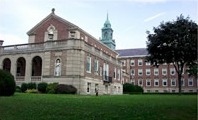 In 2009, when I graduated from seminary, I took an 8-day silent retreat. It was a time of prayer, of discernment, of really listening for what God would have me do next. It was during that retreat that I began to deal very intentionally with a desire that had been in my heart for some time: the question of joining a larger Christian communion. Growing up as a Southern Baptist, where the local church and its autonomy were always paramount, this had never really been important. But for some time I have been challenged by Jesus’ prayer in the gospel of John 17:21: that they all may be one. As part of that retreat I began to look at the two most ancient of the communions: Roman Catholicism and Eastern Orthodoxy.
In 2009, when I graduated from seminary, I took an 8-day silent retreat. It was a time of prayer, of discernment, of really listening for what God would have me do next. It was during that retreat that I began to deal very intentionally with a desire that had been in my heart for some time: the question of joining a larger Christian communion. Growing up as a Southern Baptist, where the local church and its autonomy were always paramount, this had never really been important. But for some time I have been challenged by Jesus’ prayer in the gospel of John 17:21: that they all may be one. As part of that retreat I began to look at the two most ancient of the communions: Roman Catholicism and Eastern Orthodoxy.
I spent some time going to a few Catholic churches. And while I appreciate the liturgy and I have met many a fine Catholic who is very sincere in his/her faith and love of Jesus, the sticking issue for me was the Pope. After some really bad church experiences with leaders without any accountability, the idea of one man sitting on a throne and making infallible declarations doesn’t sit very well with me. (Of course, this issue has a lot of nuance, but this is not really the letter for it… Gotta focus…)
Growing up in western Kentucky I had no idea what Eastern Orthodoxy was. And we’re all aware of the opinions shared from the pulpit about Roman Catholics. 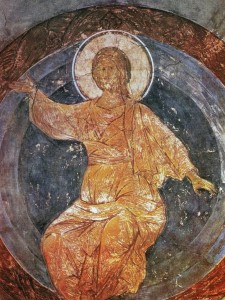 I first learned about Orthodoxy when I was an undergraduate studying Russian. And the first time I stepped foot in an Orthodox Church to pray was in 1992, when I was a student in Vladimir. I’m not quite sure that I can convey the feeling of entering into a cathedral that was built in the twelfth century and finding oneself in a continuous stream of worship to God that has been offered there over that time… But it was the Church of the Dormition that I would go to for quiet and prayer when I was an exchange student.
I first learned about Orthodoxy when I was an undergraduate studying Russian. And the first time I stepped foot in an Orthodox Church to pray was in 1992, when I was a student in Vladimir. I’m not quite sure that I can convey the feeling of entering into a cathedral that was built in the twelfth century and finding oneself in a continuous stream of worship to God that has been offered there over that time… But it was the Church of the Dormition that I would go to for quiet and prayer when I was an exchange student.
I’m not sure how much history to put in this note. But please indulge me for a moment. For roughly the first thousand years of Christianity there was one Church across Europe, Asia, and Africa. It would be simplistic to say that it was always in agreement. Even back then it had its share of arguments over who was the holiest, who was in authority, and who could make decisions about what to believe. For the first 450 years we ironed out the principles that are contained in the Nicene Creed – a statement that I never heard of growing up as a Baptist, but that we believed point by point nonetheless:
I believe in one God, the Father Almighty, Maker of Heaven and Earth and of all things visible and invisible.
And in one Lord Jesus Christ, the Son of God, the only-begotten, begotten of the Father before all ages. Light of light; true God of true God; begotten, not made; of one essence with the Father, by Whom all things were made; Who for us men and for our salvation came down from Heaven, and was incarnate of the Holy Spirit and the Virgin Mary, and became man. And He was crucified for us under Pontius Pilate, and suffered, and was buried. And the third day He arose again, according to the Scriptures, and ascended into Heaven, and sits at the right hand of the Father; and He shall come again with glory to judge the living and the dead; Whose Kingdom shall have no end.
And in the Holy Spirit, the Lord, the Giver of Life, Who proceeds from the Father; Who with the Father and the Son together is worshipped and glorified; Who spoke by the prophets.
In one Holy, Catholic, and Apostolic Church. I acknowledge one baptism for the remission of sins. I look for the resurrection of the dead and the life of the world to come. Amen.
After this, the Church survived in a relative unity until 1054 when the Roman Catholics went one way and the Eastern Orthodox Christians went the other. Their arguments were complex and, at the same time, can sound trivial to us: Can priests be married? Should there be yeast in the communion bread? Should we speak Latin or Greek when we talk about God? Should the Church have one head (a.k.a. the Pope) or is it conciliar in nature (as it had been up to this point), making decisions by council under the inspiration of the Holy Spirit?
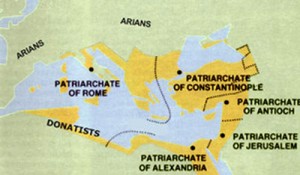 Leading up to this time there were five great centers of Christianity in the world: Rome, Byzantium, Alexandria, Antioch, and Jerusalem. But with the rise of Islam and its conquests in the East, only Rome and Byzantium remained. Eventually Byzantium (now Istanbul) also fell under Muslim control. However, Orthodoxy had spread to Kievan Rus’ and also survived under Islamic rule with some level of freedom. With the fall of Byzantium and language barriers, the average person in Western Europe soon knew nothing of Christianity in the East at all…
Leading up to this time there were five great centers of Christianity in the world: Rome, Byzantium, Alexandria, Antioch, and Jerusalem. But with the rise of Islam and its conquests in the East, only Rome and Byzantium remained. Eventually Byzantium (now Istanbul) also fell under Muslim control. However, Orthodoxy had spread to Kievan Rus’ and also survived under Islamic rule with some level of freedom. With the fall of Byzantium and language barriers, the average person in Western Europe soon knew nothing of Christianity in the East at all…
Today Orthodoxy is a communion of 15 autonomous churches who commune together, but have their own administrative authority. These "jurisdictions" historically fall along national lines. Most Orthodox churches in the United States still have historical ties to immigrant communities, though more and more people are joining that come from Western traditions: Evangelicals, Anglicans, Catholics, and others… The closest Eastern Orthodox churches to where you guys live in western Kentucky are in Cape Girardeau, Bowling Green, Evansville, Nashville, and a couple in southern Illinois. (Laura & Bryan, being in Illinois, there are a lot more historic communities near you.)
The theology of the Eastern churches is different in some ways from the majority views in the West. Substitutionary atonement (Jesus died to pay for your sins so you wouldn’t have to) is absent from the Eastern Church. It may surprise you to know that this thought only took full bloom in the 11th and 12th centuries and was articulated in its classic form by Anselm of Canterbury, a Roman Catholic bishop and theologian.
The Orthodox are also not big on the idea of Original Sin, passed from parents to children through birth… They instead like to talk about "ancestral sin" that describes the condition of the world in which innocent children are born and quickly become ensnared in sin (though born without sin or blame). Orthodoxy follows the atonement theology of the first millennium of Christianity that says that Christ became a human being, died, and rose from the dead, conquering death and beginning the process of reclaiming creation from its fallen state. And it agrees with Western Christianity that it is relationship with Christ that redeems us, changes us, sanctifies us, and brings us to eternal life.
The first year that I lived in Hyde Park I went to an Episcopal church. I came very near to being officially confirmed and joining communion with the Episcopalians (and the Anglicans more broadly). However, about a month before that confirmation was to take place, I had intense unrest that I finally was able to discern was around that choice. My journey had presented me with two choices to explore. Roman Catholicism had not been the way for me. But I settled into the Episcopal Church because I could be a Christian and a gay man there without it being a major issue. But I hadn’t explored Eastern Orthodoxy as the other choice with which my time of discernment had presented me.
For the past year I’ve been a part of a local Eastern Orthodox parish. It’s part of the Orthodox Church in America – originally founded by the Russian church when the Soviets were in control of their homeland. The OCA celebrates the liturgy in English and is now composed of many folks besides just Russians. In addition to new Christian converts, there are many Western Christians that have been received into the OCA. My particular parish at the University of Chicago is the only Eastern Orthodox church on the South Side of Chicago, so it has members from the Antiochian church (historically out of Antioch, the modern Antiochian church has both folks whose ancestors came from there and also American converts), Greeks, Romanians, Russians, Ethiopians, and garden variety Americans who know they came from Europe, but aren’t sure from where… We even have a couple of African Americans interested as well…
Being gay in Eastern Orthodoxy is a hard road. The church is slow to discuss modern issues and often buries its head in the sand rather than actually engage in dialogue. But my parish is full of folks associated with U of C and other schools in the area. The mix makes it necessary that we talk about things rather than just smile at each other and go home… I have been out as a gay man since before my first trip to the church. The priest and his wife have been very welcoming and we have become friends over time. Most everyone in my parish who has ever talked to me knows that I study Eastern Orthodox theology and queer theology in my doctoral work. We’ve gotten along very well. In some ways this may be helped by the fact that I’m single and my own Christian beliefs dictate that I remain celibate outside of a very particular kind of relationship. (Meaning, I do make space for committed, same-sex relationships. However, this goes way deeper than just dating… But that’s a separate discussion…)
Over the past year I have gone to inquirers’ classes, done a lot of reading, but most importantly, I’ve spent time in discernment in the life of the parish, going to Sunday services, as well as occasional visits to matins (morning prayer services) and vespers (evening prayer services). Orthodox Christians encourage spiritual disciplines at home as part of their faith: scripture reading and prayer and giving alms are familiar to the tradition I was raised with. They also fast for about six months out of the year – sometimes abstaining only from meat, while at others (such as now in Great Lent, leading up to Easter) the goal is abstain from all animal products (vegan). This is not done as deprivation or punishment, but because it highlights our consumption, our creature comforts, and the things that can quietly get in the way of being totally open to God. (Married Orthodox couples also abstain from sexual activity during periods of fasting, if the partners so agree as Paul suggested in his writings.)
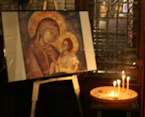 I have found my year with the local parish to be spiritually very enriching. The worship services are rich with scriptures, both read and prayed, as well as song, incense, and bells. The chanting and singing are all a capella. This ancient tradition carries forward from the Early Church. However, unlike the Church of Christ and other denominations that don’t use instruments, this is more a matter of choice than of doctrine. (There are Orthodox who don’t like modern hymns and especially dislike contemporary praise and worship. But that’s not necessary to being Orthodox and it’s certainly not everyone…)
I have found my year with the local parish to be spiritually very enriching. The worship services are rich with scriptures, both read and prayed, as well as song, incense, and bells. The chanting and singing are all a capella. This ancient tradition carries forward from the Early Church. However, unlike the Church of Christ and other denominations that don’t use instruments, this is more a matter of choice than of doctrine. (There are Orthodox who don’t like modern hymns and especially dislike contemporary praise and worship. But that’s not necessary to being Orthodox and it’s certainly not everyone…)
At Easter this year, God willing, I will be chrismated and join into full communion with the Eastern Orthodox Church. Chrismation, or anointing with a special oil or balm (called a chrism), is an Early Church practice that represents the seal of the Holy Spirit. In the Orthodox tradition it is performed at the same time as baptism (as it is with Roman Catholics and Anglicans). It fell out of use in the Protestant Reformation and is absent from most traditions that have developed since then. My original baptism as a child – with water, in the name of the Trinity – is recognized as a legitimate baptism in Eastern Orthodoxy, and they will not ask me to be rebaptized. (In fact, because they recognize it, the bishop of the Diocese of Chicago and the Midwest (OCA) specifically said that I should not be baptized again.)
There is a long-standing difference between how the date of Easter is computed in the West and in the East, so it often occurs that the two traditions celebrate the Resurrection of Jesus Christ on different Sundays in a given year. This year Easter was marked on April 8 for most folks in the West, but in Eastern Orthodoxy it will be on April 15. My chrismation is scheduled to take place on Holy Saturday, April 14, before the morning service. I will participate in communion for the first time during the Easter Vigil.
With much love,
Bryce
***
I’ve tried to anticipate some questions that you might have, but I don’t want to assume. So if there are any questions that you want to ask, I’ll try to answer. It may take some time if they’re really big ones. But because you are my family I want to try to be as transparent in this process as possible.
A few things you might be interested in:
What do you do in church?
I wrote a couple of pages for the parish’s website to explain things about worship:
Mom, Dad, and Jonathan went to church with me on Christmas morning for a short service. (No communion that day, so it was much shorter than usual.) So they can tell you a bit about the experience if you want to ask them…
How do Orthodox view salvation?
Here’s a YouTube video that deals with this question:
One of the things that causes difficulty in conversation sometimes is a matter of terminology. I believe what Paul says, "For by grace are ye saved through faith; and that not of yourselves: it is the gift of God: Not of works, lest any man should boast." And at the same time I agree with James: "Even so faith, if it hath not works, is dead, being alone."
Contrary to popular belief, Eastern Orthodox Christians do not believe that their "good deeds" are earning them a place in heaven. Rather, they believe that if their faith is true, that it will show in how they lead their lives.
Do you have a pope?
No. Each of the jurisdictions in the Eastern Orthodox communion has its own head. The Ecumenical Patriarch of Constantinople is the "first among equals." It is an honorary title, but he has no authority over the other patriarchs.
Do you worship Mary? Saints? Icons?
No. Emphatically no. Worship is reserved from God alone: Father, Son, and Holy Spirit.
Mary has a special place in Eastern Orthodoxy as the human being who said, "be it unto me according to thy word," agreeing to be the vessel through whom the Son entered the world. Mary’s song (the Magnificat) in Luke says, "For he hath regarded the low estate of his handmaiden: for, behold, from henceforth all generations shall call me blessed." Orthodox Christians take this seriously and sing songs in which Mary is called "blessed."
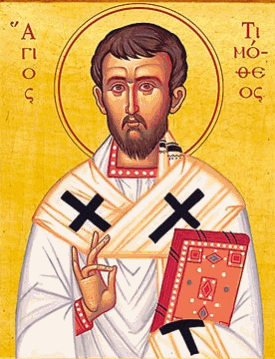 As to saints… Orthodox Christians (like several other Christian traditions) do not pray to saints. However, they do ask the saints for their prayers. They do this in the same way that we might ask our friends or a pastor to pray for our concerns with us. This is intercessory prayer. The difference is that these people have already died. However, if nothing can separate us from the love of Jesus including death (Romans 8:38-39) and if to be absent from the body is to be present with the Lord (2 Corinthians 5:8), then we believe that death is no barrier to those who are in Christ Jesus.
As to saints… Orthodox Christians (like several other Christian traditions) do not pray to saints. However, they do ask the saints for their prayers. They do this in the same way that we might ask our friends or a pastor to pray for our concerns with us. This is intercessory prayer. The difference is that these people have already died. However, if nothing can separate us from the love of Jesus including death (Romans 8:38-39) and if to be absent from the body is to be present with the Lord (2 Corinthians 5:8), then we believe that death is no barrier to those who are in Christ Jesus.
Sometimes people point to Deuteronomy and prohibitions against mediums and necromancers as proof that we should have nothing to do with the dead. However, unlike Saul’s attempt to reach Samuel through the witch of Endor, intercessions are not a two-way communication. Proper Orthodox veneration of saints does not ask them to send messages back to us or speak directly to the person asking for prayers. It asks them to pray on behalf of the person.
Nor is this meant to be a mediator in any way other than one’s prayer partner or anyone else saying prayers of intercession on someone else’s behalf. However, the saints are remembered for their exemplary lives of faith in Christ. And so they are chosen as "prayer partners" because there’s reason to believe they may be more sincere in their follow-through than the gossip queen on the street corner…
Icons are an interesting and often misunderstood subject. They come from a society that couldn’t read and were the only thing that many earlier Christians had to go on. Eastern Orthodox Christians view icons as windows to the spiritual world. They do not worship the icons and they are not practicing idolatry. They are used for prayer and contemplation; however, they are not worshiped or prayed to.
Contrary to one popular misconception, God the Father is never represented in an Eastern Orthodox icon.
The Holy Spirit makes visible the Christ through representations of Jesus, saints, and scenes from the Bible. In some ways this is analogous to saying that we see Christ in another person. We are not suggesting that that person is Jesus. But instead are saying that the Holy Spirit illuminates that person so that we can see Christ through him or her. The same is believed to be true of these icons of the saints who have gone on before us.
What about the "One True Church" business?
Orthodoxy claims that it holds the "deposit of faith," and that everything necessary to salvation is found within the Orthodox Church. This is to say that everything that is needed for salvation is present. They’re not waiting for future revelation. They believe that the teachings necessary are already with us. They also believe that you can’t internalize them just in your head, but have to take them into your heart and allow them to change your whole being into the image of Christ.
Many Orthodox Christians feel that they are the true heirs to the Gospel (just like a lot of folks in any other Christian tradition). I have been through enough different branches of Christianity to know that Christ is found in the midst of many worshiping congregations and that none of them have a corner on the Truth. When I was in my 20s and encountered the living Christ outside of the Baptist church for the first time it was very shocking to me. But over time I’ve grown to recognize the work of Christ in the lives of individuals in some very unexpected places.
At the same time, there are plenty of unbelievers and lukewarm Christians in most traditions as well. In the end, I withhold judgment about anyone’s eternal destination. This is what the parable of the wheat and the tares (Matthew 13) is all about. While we’re all "growing in the field," we pretty much look the same. We’re all human; we all miss the mark or "fall short of the glory of God." It will be at the harvest, when our fruits are judged by God, that it will be clear who’s who. And God will sort that out.
In this way, I’m a little different than lots of "cradle" Orthodox and a fair number of converts. Many folks are looking for THE RIGHT PATH. They think that they can find it in some tradition, with the right translation of the Bible, the right songs, the right days of the week to worship on, the right percentage of tithes and offerings… But in the end, I believe that JESUS is the WAY… not a set of actions and deeds. While the rest of these things are means to an end, they are no guarantee of salvation.
Having said that, I embrace ways of Orthodox worship, fasting, prayer, the reading of Scripture, and I read and study Orthodox theology because I believe that they challenge me to "run the race," to strive toward the goal, and keep my focus on Christ. It’s not the only way… but I find it a rich and deeply meaningful way.
Are you going to be a priest?
I doubt it… I’ll settle for being a theologian and a contributing member of a Christian community, as a part of the priesthood of all believers, or as the Orthodox call it, the Royal Priesthood.
In Eastern Orthodoxy there are three priesthoods: the Royal Priesthood, the Priesthood of Orders or Ministerial Priesthood, and the Great High Priest who is Jesus Christ. The Priesthood of Orders is the clergy. It is often viewed hierarchically; however, in its first form it is a matter of being ordained with certain spiritual gifts to perform certain functions in the Body of Christ.
What Bible do you read from?
The Eastern Orthodox Church is heir to the New Testament scriptures in Koine Greek, as well as the Hebrew Scriptures in the form of the Septuagint, which was translated from the Hebrew in approximately 200-132 BC. The texts remained in Koine until they were translated into Byzantine Greek around 600 AD. They are thus separate from the Masoretic Hebrew texts which were "pointed" and fixed in their current form between the seventh and tenth centuries AD. The Septuagint was used (along with the Vulgate) by the translators of the King James Authorized Version to correct the Rabbinic texts they used for the Old Testament.
My Russian Bible comes from the Synodal translation which is based on the Old Church Slavonic that was translated by Cyril and Methodius when they came as Greek missionaries and evangelized the Slavs. My Greek New Testament is a critical edition, so it shows the variations of all of the extant Greek manuscripts, marking variations between textual traditions by name so that the reader can follow a given tradition.
That said, I’m not sure that I’ve ever heard anyone stress the use of a particular version.
What about the MCC?
I have been in touch with MCC and kept them in the loop throughout this process. They are supportive and would like me to remain on the denominational Theologies Team. MCC often calls itself a "both/and" church and recognizes dual affiliations. As long as the Church is still a place where LGBTQ folk experience overwhelming hostility, there will be a place in the world for MCC. It is the only place in many communities where LGBTQ folk can go and hear that God actually loves them.
I sometimes have trouble when MCC’s message stops there. I believe that God loves each and every one of us so much that He isn’t content with just letting us remain in our current state. God doesn’t violate our free choice, but is (I believe) very happy when we choose to live a life of discipleship and walk out our religious convictions rather than just mouthing pious statements. This would include for many folks (gay and straight) getting our sex lives in order.
(As a side note, there are parts of MCC that believe very much in holiness and God’s call to us to take up our cross and follow Christ daily. The membership as a whole, like many of today’s denominations, runs the gamut from very conservative to very revisionist in its thinking.)
How can you, as a gay man, join the Orthodox, who are so clearly anti-gay?
I believe part of what I’ve tried to convey is a sense of belonging in Orthodoxy. And a call to be part of a community that urges each other on, sharpening each other as we press towards the goal.
At the same time, I believe strongly in the conciliar nature of the Church. This means I take seriously Jesus’ prayer that we all may be One. And sometimes that means moving slowly in order for everyone to get on board with the program.
The Church has tried to move quickly in the past, resulting in some very deep rifts, from the Great Schism, to the Protestant Reformation, to subsequent fracturing into literally thousands of denominations that we have seen in the Christian West over the past 500 years. The Church is so broken now that most folks don’t think twice about splitting off and starting a new congregation at the slightest sign of conflict in a congregation. And to top it off, each one seems to rest secure in its belief that it’s the "right" denomination with the "right" views.
I’m much more content to ride along slowly. Sometimes the movement is glacially slow… In fact, other than the acceptance of Gentiles into its ranks, most of the other things the Church has worked out have taken a very, very long time. It took hundreds of years to come to consensus about the Trinity, or the two natures of Christ. Even after astronomers had blazed the path, it took the Church quite a while to embrace the idea that the earth rotates around the sun and not vice versa. It has taken the better part of Christian history to figure out that slavery is immoral (even though it is condoned in the Bible) and that women are complementary to men and both are created in the image of God. Along the way there have been martyrs and confessors (people who have died for and suffered torture for their witness) to what God has shown them as a clearer understanding where we hadn’t quite caught the vision of God’s work in the world. Yet the Church moves slowly along…
I believe that this is a watershed time, when the Church is beginning to deal with LGBTQ folks, both within the ranks of Christians, as well as those on the outside. And like Peter who expected to find nothing good among the Gentiles, I believe that God is speaking again, "Do not call profane that which I have created." I’ve seen movement on this in the Orthodox Church as well over the past year. And it has led me to believe that God is indeed doing something. But, as I noted before, with the glacial speed of a conciliar church model, chances are the Church will come to understand what God is doing with LGBTQ Christians well after I am already dead… But it’s worth it to me to stay on the inside as a witness rather than simply going to a place that is "safe."
Does this mean you’re politically conservative now?
No. And I’m not a cookie-cutter liberal either. I remain committed to the ideals set out by Christ: feed the hungry, give water to the thirsty, clothe the naked, take care of the less fortunate… Render unto Caesar that which is Caesar’s (which is a terribly subversive comment because, what exactly is Caesar’s that is not first God’s?). This Q&A section isn’t really the place to go any deeper than that. I prefer those conversations to be in person, where we can fully interact.
***
I started working on this a month ago, thinking it wouldn’t take too long. But now my chrismation service is only three days away, so I feel that should go ahead and send it. If you’ve made it this far, thanks for your attention. I know it’s a lot to read…
Love,
Bryce
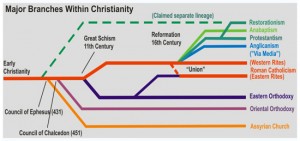
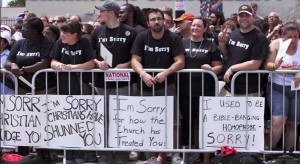
Composing and posting this blog article must have taken a fair bit of your time, hence, I just want you to know that I am appreciative of the effort. What you posted is quite interesting and informative. Thank you for sharing.
The Old Testament never condoned "chattel" slavery. It did permit indenture (leviticus 25:39) and the forced labor of enemy captives in wartime. On the contrary, the law of moses prescribed the death penalty for kidnapping a human being and selling them into slavery as chattel (Exodus 21:16) so your analogy falls flat.
you need to carefully search the scriptures before attempting to make such a point. We don’t "change" the holy orthodox church, bryce – the church changes us. 😉
Dear Robert,
Thank you for your comment. When I claimed that slavery is supported in the Bible, I was actually referring to the New Testament and the practice of slavery in Greco-Roman culture. More specifically, we know that Onesimus was a slave who ran away from Philemon. Rather than calling for his emancipation, Paul sent him back with a letter. Slaves are also common among the recipients of Paul’s letters, as analysis of the names listed in his greetings shows. Further, Colossians (which is a letter of disputed authorship, but that doesn’t matter here) includes direction to slaves (δοῦλοι) to obey their masters.
Slaves were a commonplace in the first century. And they were definitely treated as property. Slave owners also took sexual liberties with both male and female slaves. An easy read on the subject of what owners could do with their slaves is found in chapter 3 of Sarah Ruden’s book Paul Among The People: The Apostle Reinterpreted and Reimagined In His Own Time.
On your second claim that we do not change the Holy Orthodox Church, I will point out that the Holy Orthodox Church has most definitely changed over time. Ask any historian of liturgy or canon law. Ask any theologian worth her or his salt. There have been many disputes in our history—including those that prompted the convening of ecumenical councils—in which our interpretations of Holy Tradition have run into questions that required further reflection and elucidation. In some of those cases, the Fathers adopted new vocabulary to distinguish between concepts (e.g., ousia vs. hypostasis), while in others they sought to clarify issues that were had fallen into dispute.
The Orthodox Church comprises many members. Those members bring various gifts to the Body of Christ. And along with those gifts they bring different life experiences and different vantage points from which they have encountered the Holy Spirit. It is in the sharing of those experiences and vantage points and the discernment of all of the Church’s members together that we are able to move into better understandings of Truth. It is in this communal process that we both correct misunderstandings (both individual and collective) and also sometimes discover a minority experience or viewpoint that turns our collective thinking in a new direction. (For example, Maximus Confessor’s insistence on the two wills of Christ during the monothelite controversy. He became a confessor because he defied both emperor and bishops, resulting in the loss of his tongue and his hand. But in the end, his views were vindicated.)
Vladimir Lossky’s "Tradition and traditions" offers an exploration of the distinction between Tradition as encounter with the Holy Spirit and traditions as the modes of receiving Revelation that is much more eloquent (and longer) than I can give here. He is but one of the 20th century Orthodox theologians who thought a lot about how we approach Holy Tradition and how we distinguish the human customs from the encounter with God. There are many others: Fr. Georges Florovsky, Fr. Dumitru Stăniloae, Fr. John Meyendorff, Met. Kallistos Ware, and Archimandrite Lazarus Moore have all given thought to both distinguishing between items that are temporal and recognizing the inbreaking of the Holy Spirit.
The last point I’ll make in this regard is that the discernment that Lossky calls for takes all of the Church’s members. Instead of simply standing on traditions and quoting bible verses, our discernment requires that we actually understand what those traditions and scripture passages are talking about. We also have to labor to distinguish, even in scripture, between what is human and what is divine. We have to work to understand that sometimes the scriptures record negative examples that warn us of pitfalls of the past. And sometimes we even have to realize that the cultural context clouded the truth. The Orthodox tradition is replete with multiple interpretations for passages. What we haven’t really done is the hard work of evaluating our encounter with contemporary biblical scholarship, though again, our theologians are aware of the issue and have made various calls for work and discernment.
I’m no Maximus Confessor, nor am I a Cappadocian bishop like Basil the Great or Gregory the Theologian. But I have given a significant portion of my life to studying their work and the work of other theologians (Orthodox and others), to biblical studies, and the study of Church history. My own life experiences have given me particular insights. I am open to conversation with the Church and rely on the conciliar nature of our shared work to correct my own errors. And at the same time, it will take actual discernment on the part of all parties to figure out the contours of our anthropology. I do not know how the conversation around LGBTQ issues will be resolved. Yes, we are changed by our participation in the Body of Christ. That includes all of us. 🙂
Bryce,
Several months ago I posted a question in reply asking if you could cite one or more examples where the Holy Orthodox Church "changed" a fundamental teaching concerning grave sins, such as those involving the taking of a human life, matters of human sexuality, et cetera.
There is a great and wide gulf between "further reflection and elucidation" and outright "change". I’m sure you’re busy with various studies or perhaps my question disappeared into cyberspace. 🙂
Hopefully you can soon find time to answer it.